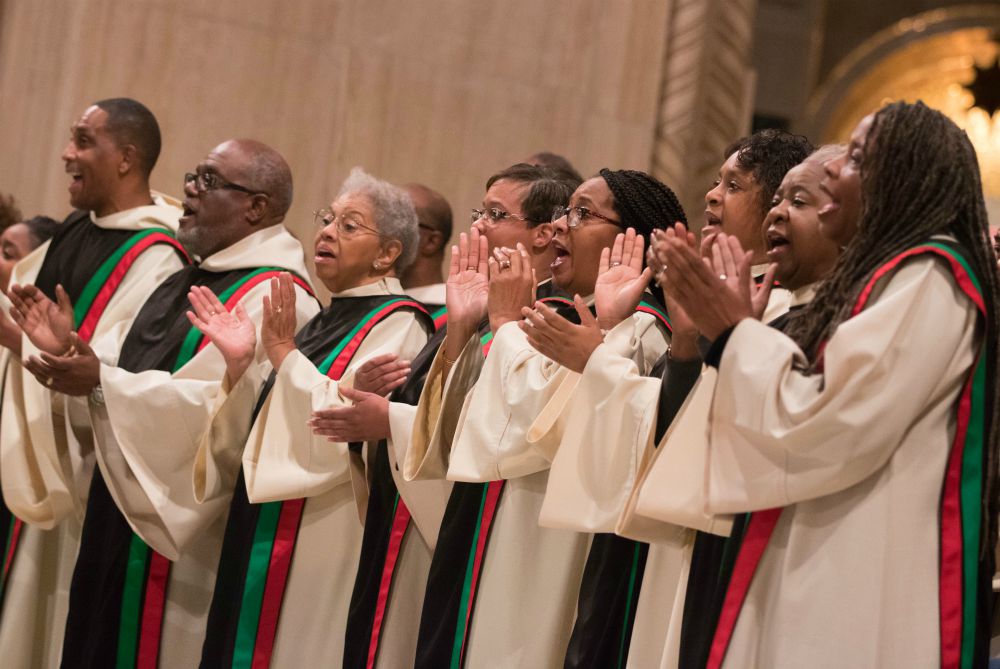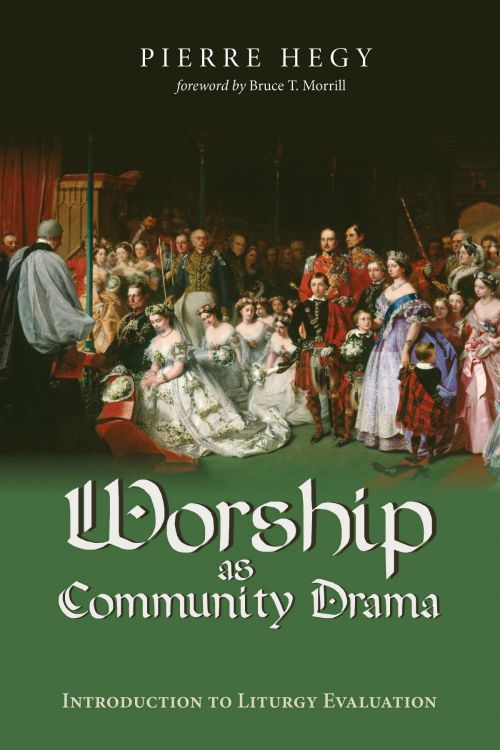
Members of the St. Augustine Gospel Choir sing during a Feb. 3, 2018, Mass at the Basilica of the National Shrine of the Immaculate Conception in Washington. (CNS/Washington Archdiocese/Daphne Stubbolo)

Pierre Hegy, professor emeritus of sociology at Adelphi University, Garden City, New York, has been researching the intersection between the sociology of religion and church renewal, especially in the area of parish life and worship. His latest volume might be regarded as a further exploration of the themes investigated in his two previous books, Wake Up, Lazarus! On Catholic Renewal (2012) and Wake Up Lazarus! Volume II: Paths to Catholic Renewal (2013)
The focus of this new volume, Worship as Community Drama, is indicated by two words in its subtitle: liturgy evaluation. Hegy shrewdly notes that today one can hardly buy anything without being asked to evaluate the entire commercial exchange, from the quality of the product to the helpfulness of the service, customer satisfaction and likely recommendation of the seller to other customers. And yet, it is highly unlikely that a pastor, particularly in the Catholic Church, would ask the faithful of the parish to evaluate their most central act of Christian worship, the Sunday Mass. Moreover, most priests, were they willing to do so, would not know where to begin.
This is where Hegy's book comes in very handy. But it is not simply a how-to manual, with a list of do's and don'ts that can be easily checked off to gauge the success or failure of a particular act of worship. This is because liturgy and worship are not individual acts that can be measured by objective and discrete criteria but communitarian interactions among the participants and between the participants and God. Following the sociologist Émile Durkheim, Hegy maintains that religion is essentially social, and that religious rituals, be they Sunday Mass, wedding, funeral, bar mitzvah, first communion or quinceañera, are not the pre-formulated ritual scripts but the performance of them by the community. Religious rituals are not simply pre-scripted events but dramas, the success of which cannot be determined by verifying how accurately the script has been followed but only by examining how in these performances the participants socially interact with each other and how they relate with God.
Advertisement
It is necessary, therefore, to devise an appropriate conceptual tool to measure the efficacy of Sunday Mass as performed drama, and this is what Hegy provides in this book. Before doing so, Hegy points out that this view of sacrament coheres with the best contemporary sacramental theology. He mentions Edward Schillebeeckx (sacraments are personal encounter with God), Louis-Marie Chauvet (rituals are symbolic exchange), and David Brown (worship as "moving text" powered by human imagination). In developing his own criteria for ritual interaction analysis, Hegy draws on insights of Alfred Schutz ("life-world"), George H. Mead (inner dialogue between the "I" and the "me"), Erving Goffman (interactions as "dramaturgical performances"), and especially Randall Collins.
Adopting Collins's eight-item model of interaction ritual analysis, Hegy groups them in two clusters: the first four dealing with the interaction processes (description) and the remaining four with the interaction outcomes (analysis).
The descriptive questions are:
- What is basic information about the worshiping community, especially its clergy and its celebrating style?
- What are the key parts of the ritual process?
- Which are the attitudes and emotions of the celebrating congregation? Are the participants engaged, non-engaged or actively disengaged?
- Does the worship lead the participants to greater closeness with each other and with God?
The analysis questions are:
- Does worship bring about a higher level of participatory leadership and an increase in the community's involvement in various activities in the parish?
- Does worship establish a pattern of relationship and, if so, which type (hierarchical or egalitarian) between the clerical leader and lay members of the parish?
- Does worship shape a moral consensus within the community, that is, a set of common moral values, regarding controversial ethical issues, spiritual practices and financial contributions?
- Do the seven above-mentioned variables contribute to the increase or decrease of the "spiritual and emotional energy" of the whole parish?
In the remaining parts of the book (Chapters 2-9), Hegy applies these eight variables to different liturgical acts: American TV Masses, Pontifical Masses at Notre Dame of Paris, six papal Masses, two ordinary Catholic parishes, one Evangelical-Pentecostal church, a black Catholic parish, and the Zairean Rite. Needless to say, each of these liturgies scores differently on the eight variables. The point is not to critique and rank them but to learn from Hegy's empirical and participant-observer research how to use the variables in order to evaluate the liturgical worship of one's own community.
The last chapter emphasizes the need of a scientifically reliable and valid methodology to conduct liturgical evaluation. Hegy, however, is convinced that more than scientific methodology, worship must be informed by mystagogy (the sense of mystery) and vision, which are communicated not only by the presiding celebrant but also by other components of the worshiping act such as the congregation, the choir and the homily.
Rare are writers who are able to bring together sociological research and theology into a coherent synthesis to promote church reform. Hegy's tireless and selfless research and writings bring to life ecclesial experiences throughout the globe, and his work offers precious gifts to the church. As I have done with his previous publications, I most strongly recommend this book, not least to pastors and seminarians. Nothing less than the survival of the church is at stake.
[Peter C. Phan is the Ignacio Ellacuria Chair of Catholic Social Thought at Georgetown University.]
Editor's note: Love books? Sign up for NCR's Book Club list and we'll email you new book reviews every week.







